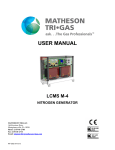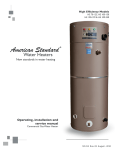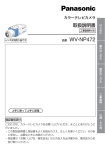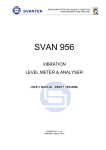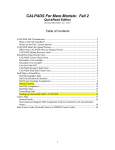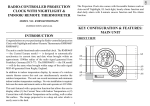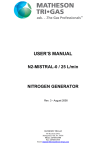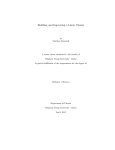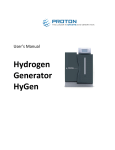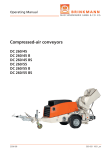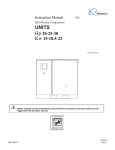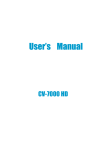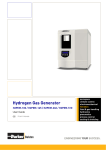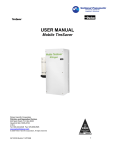Download User Manual - Masterflex
Transcript
USER MANUAL ® NitroFlow Lab NITROGEN GENERATOR Parker Filtration & Separation B.V. PO Box 258 4870 AG - Etten-Leur The Netherlands Tel: +31 (0)76-508 53 00 Fax: +31 (0)76-508 53 33 E-mail: [email protected] www.parker.com/pfs K3.1.142e Manual NitroFlow Lab.1 -1- © 2009 Parker Filtration & Separation B.V. All rights reserved No part of this publication may be reproduced and/or publicized by being printed, photocopied, placed on microfilm or in any other manner without the prior written permission of Parker Filtration & Separation B.V. Parker Filtration & Separation B.V. retains the right to make changes in parts at any point without first or directly notifying the customer. The contents of this manual can also be changed without prior warning. This manual is valid for the NitroFlow® Lab in its standard version. Parker Filtration & Separation B.V. can therefore not be held liable for specifications of the delivered system that may deviate from the standard version. For information concerning adjustments, maintenance or repairs not contained in this manual, please contact Parker Filtration & Separation B.V. This manual has been prepared with all possible care, but Parker Filtration & Separation B.V. cannot accept responsibility for possible errors in this document or for the consequences thereof. K3.1.142e Manual NitroFlow Lab -2- USER MANUAL ...........................................................................................1 1 INTRODUCTION ...................................................................................5 1.1 1.2 1.3 1.4 1.5 1.6 1.7 2 HEALTH, SAFETY AND ENVIRONMENTAL ASPECTS.....................9 2.1 2.2 2.3 2.4 2.5 3 General.........................................................................................16 Capacity data................................................................................19 Maintenance kit ............................................................................19 INSTALLATION ..................................................................................20 5.1 5.2 5.3 5.4 5.5 5.6 6 General.........................................................................................12 Separation principle......................................................................12 Parts .............................................................................................13 Process diagram...........................................................................14 Process scheme ...........................................................................15 TECHNICAL SPECIFICATIONS.........................................................16 4.1 4.2 4.3 5 General...........................................................................................9 Nitrogen and oxygen ......................................................................9 Electricity ......................................................................................10 Safety precautions........................................................................10 Environmental aspects .................................................................11 DESCRIPTION OF THE APPLIANCE ................................................12 3.1 3.2 3.3 3.4 3.5 4 General...........................................................................................5 Pictograms......................................................................................6 Identification and service................................................................7 Certificates......................................................................................7 Use in accordance with purpose ....................................................8 User instructions.............................................................................8 Liability............................................................................................8 Transport ......................................................................................20 Define location..............................................................................20 Unpack and check equipment ......................................................21 Connect nitrogen consumer .........................................................21 Connecting power.........................................................................21 Connect input and output signals .................................................22 OPERATION OF THE CONTROL SYSTEM ......................................24 6.1 Menu structure..............................................................................24 K3.1.142e Manual NitroFlow Lab -3- 6.2 Main screen ..................................................................................24 6.3 Settings menu .........................................................................26 6.3.1 Log on menu ....................................................................27 6.3.2 Alarm settings menu ........................................................28 6.3.3 Pressure switch menu ....................................................30 6.3.4 Options menu ..................................................................31 6.3.5 Local settings menu .........................................................32 6.3.6 Maintenance menu ..........................................................33 6.3.7 Data logging menu ..........................................................36 7 OPERATION .......................................................................................38 7.1 7.2 7.3 7.4 7.5 8 ® Commisioning NitroFlow Lab......................................................38 ® Start NitroFlow Lab .....................................................................39 Adjusting the purity .......................................................................39 Control of the outlet pressure .......................................................40 ® Stop NitroFlow Lab .....................................................................41 TROUBLESHOOTING ........................................................................42 8.1 Error list ........................................................................................42 8.2 Alarm messages 9 ...............................................................43 MAINTENANCE ..................................................................................45 9.1 9.2 9.3 9.4 9.5 9.6 Maintenance scheme ...................................................................45 Replace inlet filter element ...........................................................45 Replace oxygen sensor................................................................47 Calibrate oxygen sensor...............................................................47 Replace compressor.....................................................................48 Software updates..........................................................................50 10 ELECTRICAL SCHEME ..................................................................52 11 INDEX ..............................................................................................53 K3.1.142e Manual NitroFlow Lab -4- 1 Introduction 1.1 General ® The NitroFlow Lab is a product of Parker Filtration & Separation B.V. This manual forms an integral part of the product. The manual describes the installation, daily operation, maintenance and troubleshooting. Content ® Read the manual carefully before you start with the NitroFlow Lab. These instructions must be thoroughly understood before installing and operating this product. Failure to operate this product in accordance with the instructions set forth in this manual and by other safety governing bodies will void the safety certification of this product. If you have any questions or concerns, please call your local representative or the technical services department: Europe +(44) 1622 7233 00, USA +(1) 800 343 4048 Condition of change ® No changes may be made to the NitroFlow Lab as supplied, without explicit prior written permission by Parker Filtration & Separation B.V. Nonconformance to this rule, as well as any consequential damage, loss and costs are the responsibility of the owner and the user. Information All information in this manual, including additional drawings and technical descriptions, remains the property of Parker Filtration & Separation B.V. and may not be used (otherwise than for the use of this product), copied, multiplied or published to or for a third party without explicit prior written permission by Parker Filtration & Separation B.V. K3.1.142e Manual NitroFlow Lab -5- 1.2 Pictograms In this manual and on the generator, the following pictograms are used: Warning A warning shows a hazard that can cause death or serious injury. Follow the instructions. Caution A caution shows a danger that can cause damage to the equipment. Follow the instructions. Electricity High voltage: danger of electric shock. Warning Risk for death due to suffocation. Risk of fire Oxygen-enriched air leads to an increased risk of fire in the event of contact with inflammable products. High-pressure risk Follow the instructions with respect to compressed gasses. Environment Instructions with respect to the environment. Read instructions in the manual. K3.1.142e Manual NitroFlow Lab -6- 1.3 Identification and service The identification plate is located on ® the back of the NitroFlow Lab. The identification plate shows the ® characteristics of the NitroFlow Lab. For service and technical assistance, please contact: PARKER HANNIFIN (UK) LTD Industrial Division Suite 42, Kent House, Romney Place Maidstone, Kent ME15 6LH, England Tel: +44 (0)1622 772440 Fax: +44 (0)1622 772446 For North America: PARKER HANNIFIN CORPORATION Filtration and Separation Division 242 Neck Road Haverhill, MA 01835, USA phone: 800-343-4048 or 978-858-0505 fax: 978-556-7501 http://www.labgasgenerators.com 1.4 Fig. 1-1: Identification plate Certificates ® The NitroFlow Lab meets the following requirements: Subject Applicable standard Electromagnetic compatibility (EMC) NEN-EN-IEC 61000-6-3:2001 NEN-EN-IEC 61000-6-1:2001 EN 61326(1997) + A1(1998) + A2(2001) + A3(2003), class A EN 61000-3-2(2000) EN 61000-3-3(1995) + A1(2001) Electrical safety NEN EN 60204-1:2001 st Safety for laboratory use UL 61010A-1 (1 Ed) CAN/CSA-C22.2 No. 61010-1-04 IEC 61010-1:2001 K3.1.142e Manual NitroFlow Lab -7- Safety of pressure equipment Installation Quality assurance Environmental care 1.5 Sound engineering practice IEC 61010-1 Cat II ISO 9001:2000 ISO 14001:2004 Use in accordance with purpose ® The NitroFlow Lab is intended to produce nitrogen out of normal ambient air. The system is based on gas separation membranes. Each different or further use will not be in conformity with the purpose. Parker Filtration & Separation B.V. will not accept any liability for improper use. ® The NitroFlow Lab is in compliance with the prevailing directives and ® standards. Only use this NitroFlow Lab in a technically perfect condition, in conformity with the purpose as described above. 1.6 User instructions ® Only well-trained personnel are allowed to work on the NitroFlow Lab. The ® user must be aware of hazards related to operating the NitroFlow Lab and ® processes connected to the NitroFlow Lab. The user is responsible for the ® safety of the personnel. All personnel working on the NitroFlow Lab must have free access to the applicable manuals. 1.7 Liability Parker Filtration & Separation B.V. will not accept any liability if: • The instructions in this manual are ignored. • Replacement parts are used which are not approved by the manufacturer. • The NitroFlow Lab is operated incorrectly. • The system is fed with other gasses than air. • The NitroFlow Lab is modified without notification and authorization of Parker. • Maintenance and repair are not carried out according to the instructions. ® ® K3.1.142e Manual NitroFlow Lab -8- 2 Health, safety and environmental aspects 2.1 General ® Correct use of the NitroFlow Lab nitrogen generator is important for your ® personal safety and for trouble-free functioning of the NitroFlow Lab. ® Incorrect use can cause damage to the NitroFlow Lab or can lead to incorrect gas supply. Warning • Read this manual before you start the installation and ® putting into operation of the NitroFlow Lab. Prevent ® accidents and damage to the NitroFlow Lab. • Contact your supplier if you detect a problem that you cannot solve with this manual. ® • Use the NitroFlow Lab in accordance with its purpose. Refer to §1.5. • Only service-engineers, qualified to work on electric and pneumatic equipment, are allowed to do the installation, maintenance and repairs. Unqualified people are not allowed to repair the equipment. Refer ® to §1.6. Lift the NitroFlow Lab with a forklift. Follow the legislation and instructions for operating the forklift. • Do not tamper or experiment with the equipment. Do not exceed the technical specifications for the ® NitroFlow Lab. Refer to chapter 4. 2.2 Nitrogen and oxygen ® The NitroFlow Lab generates nitrogen as a product. Oxygen enriched air is released as waste. Warning • Nitrogen can cause suffocation! • Oxygen-enriched air leads to increased risk of fire in the event of contact with flammable products. Make sure that there is adequate ventilation at all times! K3.1.142e Manual NitroFlow Lab -9- • • 2.3 ® The NitroFlow Lab is not designed for installation in an Exx-classified area. ® Do not install the NitroFlow Lab in an area where explosive mixtures may occur. Electricity Warning • Only service-engineers, qualified to work on electrical equipment, are allowed to do the installation, maintenance and repairs. • Disconnect the main power supply before you do the maintenance or repair. ® • If a service-engineer has to work on the NitroFlow Lab while the electric power it is connected, the service-engineer must be very careful with respect to the electric hazards. 2.4 Safety precautions Warning • Make sure that the ventilation rate is sufficient in the room where the enriched oxygen is ventilated, or lead the enriched air outside. Keep the ambient temperature between 10 and 35 °C. • Install the peripheral equipment, piping and nitrogen storage vessels according to standard procedures. Parker Filtration & Separation B.V. cannot take responsibility for this. ® • Do regular maintenance to the NitroFlow Lab, to ensure proper and safe operation. Refer to chapter 8. • Make sure that instructions concerning health and safety are compliant with the local legislation and regulations. K3.1.142e Manual NitroFlow Lab - 10 - 2.5 Environmental aspects ® The use and maintenance of the NitroFlow Lab does not include environmental dangers. Most parts are made of metal and can be disposed ® in the regular way. The packaging of the NitroFlow Lab is 100% recyclable. Optimal sizing of buffer tanks and setting of the pressure switch will result in minimal energy consumption. The lower the delivery pressure, the longer the lifetime of the system. According to EC-regulations electrical systems have to be disassembled and recycled at the end of their life. Parker Filtration & Separation B.V. can support you in this. Make sure that instructions concerning health, safety and environment are compliant with the local legislation and regulations. K3.1.142e Manual NitroFlow Lab - 11 - 3 Description of the appliance 3.1 General ® The NitroFlow Lab separates compressed air produced by an on-board compressor into nitrogen and an oxygen enriched air stream. The separation system is based on membranes. 3.2 Separation principle B A C H2O - H2 F O2 N2 S Fig. 3-1: Separation principle A B C Pressurized air inlet Hollow fibre membrane Nitrogen outlet F S Fast permeation Slow permeation Ambient air contains nitrogen (78.1%), oxygen (20.9%), argon (1%), carbon dioxide, water vapor and traces of other inert gasses. Pressurized air (A) is led through hollow fibre membranes(B). The various air components diffuse through the porous wall of the membranes. The diffusion rate differs for the various gasses: • Oxygen and water vapor have a high diffusion rate and diffuse rapidly through the membrane wall. • Nitrogen has a low diffusion rate and diffuses slowly through the membrane wall. Pressurized nitrogen enriched air is released at the outlet of the membranes (E) which can be stored in a nitrogen storage vessel. K3.1.142e Manual NitroFlow Lab - 12 - 3.3 Parts A Nitrogen compressor B Hollow fiber membrane and heat exchanger (M) C Air compressor D Inlet carbon adsorber (C) E Purity adjustment valve(FCV) F Oxygen sensor G Sample flow control valve (do not adjust) (FCV) H Touch screen display I Pressure control valve (PCV) J SD-card K Pressure relief valve (PSV) L Non-return valve (V1) K3.1.142e Manual NitroFlow Lab - 13 - M Main switch/ circuit breaker N Electrical feed cable O Product outlet /ball valve P Ventilation outlet (keep clear) 3.4 Process diagram ® The NitroFlow Lab can be connected directly to the nitrogen consumer (Fig. 3-3) or to a buffer vessel (Fig. 3-4). Nitrogen Consumer NitroFlow Basic Mobile Fig. 3-3 Buffer Vessel NitroFlow Basic Mobile Nitrogen Consumer Fig: 3-4 K3.1.142e Manual NitroFlow Lab - 14 - 3.5 Process scheme N1 N2 C LP RKV M PI1 FCV HP PCV PI2 V1 N2 V2 V4 PSV1/2 K3.1.142e Manual NitroFlow Lab - 15 - Air inlet Nitrogen outlet Inlet carbon adsorber Air compressor Start up valve Gas separation membrane Membrane pressure indicator Flow control valve Nitrogen compressor Nitrogen pressure relief valve Nitrogen pressure indictor Non return valve Nitrogen outlet Ball valve Depressurisation valve Pressure relief valves 4 Technical specifications 4.1 General Delivery pressure Maximum delivery pressure 8 bar(g)/116 psig Ambient conditions Temperature 10 to 35 °C / 50 to 95 °F Air quality Normal clean ambient air, relative humidity < 90% Max. ambient relative humidity <80 % to 31°C, 50% at 40°C Noise level < 65 dB(A) @ 1 meter/3 ft Heat dissipation 1000 W (@50 Hz), 1200 W (@60 Hz) 3850 (50Hz)/4625 (60 Hz) BTU/hr Dimensions and connections Dimensions (H x W x D) [mm] 700 x 900 x 310 Dimensions (H x W x D) [inch] 27.6 x 35.4 x 12.2 Net weight 92.5 kg / 204 lbs Connections outlet: G ¼ “ / ¼” NPT Electrical data 1 Voltage/frequency 120Vac/60Hz, 230Vac/50Hz Power consumption 1400 W Plug/receptacle 230V/50Hz can be mounted locally as to local requirements 115V/60Hz: 20A/125 VAC; NEMA 520 straight blade 1 Mains supply voltage fluctuations not to exceed +/- 10% of nominal voltage. K3.1.142e Manual NitroFlow Lab - 16 - Default software settings Menu What Default setting Logs Delay-time 180 sec Local settings Language English Local settings Pressure Bar Local settings Flow LPM Local settings Purity %O2 Alarm settings O2 high Active: No Stop: 0 Level: 5 Delay: 30 Alarm settings O2 low Active: No Stop: 0 Level: 0.0 Delay: 30 Alarm settings Pin high Active: No Stop: 0 Level: 13 Delay: 30 Alarm settings Pin low Active: No Stop: 0 Level: 2 Delay: 30 K3.1.142e Manual NitroFlow Lab - 17 - Alarm settings Pout high Active: No Stop: 0 Level: 10 Delay: 30 Alarm settings Pout low Active: No Stop: 0 Level: 2 Delay: 30 Pressure switch P-switch No Pressure switch Unit on 2.0 Pressure switch Unit off 7.0 Options Auto restart No Options Remote No Options Pincode No Options Show Flow No Parts ® NitroFlow Lab 1x 1x ® NitroFlow Manual ® Lab Vac/Hz Plug Part numbers NitroFlow Lab 230 / 50 EUR 159.003848 230 / 50 UK 159.004627 120 / 60 USA 159.003868 230 / 60 EUR 159.004404 230 / 60 UK 159.004628 K3.1.142e Manual NitroFlow Lab - 18 - 4.2 Capacity data Generator Nominal production capacity Nlpm* Purity% 99.9 7.6 NitroFlow Lab 99.7 12 99.5 13 99 18 98 23 97 26 96 30 95 32 *Capacity at nominal conditions: • Ambient temperature: 20 °C /68 °F • Ambient pressure: 1013 mbar(a). 4.3 Maintenance parts Part Maintenance kit: 1x Carbon adsorber Oxygen sensor Part number 159.003754 159.002284 Battery on printed circuit board 159.004270 Fuse on printed circuit board (T1,25A, 250V, 5x20mm) 159004271 Air compressor LP/LP (230V/50Hz) Air compressor LP/LP (115V/60Hz) Nitrogen compressor LP/HP (230V/50Hz) 159.003314 159.003368 159.003313 Nitrogen compressor LP/HP (115V/60Hz) 159.003367 K3.1.142e Manual NitroFlow Lab - 19 - 93 38 5 Installation ® Follow the paragraphs in this chapter to install the NitroFlow Lab. 5.1 Transport Warning ® • Transport the NitroFlow Lab upright. ® • Put the NitroFlow Lab in the original box to transport ® the NitroFlow Lab over longer distances. ® • Lift the NitroFlow Lab with a forklift. • For qualifications of personnel, refer to §2.1. 5.2 Define location IMPORTANT ® • The NitroFlow Lab contains compressors that generate heat; for optimal performance and lifetime it is necessary that cooling air can be vented without resistance. A minimum clearance distance from walls or other objects of at least 50 cm/ 20 inches on all sides (back, left, right and top) is a necessity; also efficient local ventilation at the ventilation outlet is highly recommended especially when the device is installed under a bench ® Install the NitroFlow Lab on a fixed location. The location must meet the following requirements: • Minimum clearance of 50 cm on all sides (back, left, right and top) as to facilitate heat removal • Indoors • Dry • No continuous direct irradiation by sunlight • Away from heat sources • Properly ventilated room. • Easy accessibly for operating and service K3.1.142e Manual NitroFlow Lab - 20 - 5.3 Unpack and check equipment • Open the packaging per instructions on the crate. • Make sure that all components are delivered. Refer to § 4.1. 5.4 Connect nitrogen consumer Warning • Do not connect the power at this time. • Make sure that the inlet and outlet tubes are free of dust, particles, metal parts and curls, liquids and ® grease before you connect the NitroFlow Lab. Connect the product outlet to the application. 5.5 Connecting power 1. Connect the mains plug to a suitable wall socket with earth connection 2. The control system has in- and output contacts for remote control and alarm signaling (refer to §5.6). Warning The main supply line voltage must be within 10% of nominal rated voltage for the generator. In case of larger variations the NitroFlow Lab will stop; continued use under these circumstances will inevitably lead to motor damage. K3.1.142e Manual NitroFlow Lab - 21 - 5.6 Connect input and output signals In- and put signals can be connected to the terminal strip on the printed circuit board. K3.1.142e Manual NitroFlow Lab - 22 - Clamp ID1 Function Remote start/stop Input/output signals Digital input Nominal input current: 10 mA Voltage: internal power supply UA1 Oxygen concentration Analogue output UA2 Outlet pressure Input impedance to reach 0 mA – 20 mA: 200 Ohm K5 Start stop signal to external booster K6 General alarm (nc/no) K7 General alarm (nc/no) (=K6) K8 Spare K3.1.142e Manual NitroFlow Lab - 23 - Relay Switch voltage: 48V AC/DC Switch current: 1A AC/DC 6 Operation of the control system 6.1 Menu structure The menu structure of the control system is built up as shown below. One can always go back to a higher level in the menu by pushing the -button. Main screen Alarm Switch on/off unit Settings display Log on 6.2 Set alarms Pressure switch Options Local settings Maintenance Main screen Access: This is the start-up screen that automatically appears when the generator is switched on. Function: Gives access to the different menus. K3.1.142e Manual NitroFlow Lab - 24 - Data logging A Symbol/data Information/result When flashing there is an alarm; touch the symbol and the current alarm will be shown. Status of unit (A) Can be OFF/RUN/STAND-BY/ALARM/P-RELIEF Menu button, touch to go to settings menu Switch ON/OFF button, generator will turn ON or OFF To turn the unit on, touch the switch -button. The status will switch to PRELIEF. The compressors will start three minutes (180 seconds) after the unit has been switched on. The delay time countdown time is shown next to the text P-RELIEF (see below). K3.1.142e Manual NitroFlow Lab - 25 - When the unit is switched on the controller will show: • Actual outlet pressure • Actual oxygen or nitrogen level • Flow indication (when selected, refer to §6.3.4) 6.3 Settings menu Access: Touch settings menu button (refer to §6.2) Function: Access to different menus Symbol in the main screen Menu Access to log on menu (refer to §6.3.1) Access to alarm settings menu (refer to §6.3.2) Access to pressure switch menu (refer to § 6.3.3) Access to options menu (refer to § 6.3.4) Access to local settings menu (refer to § 6.3.5) Access to maintenance menu (refer to § 6.3.6) Access to data logging menu (refer to § 6.3.7) Returning to previous menu K3.1.142e Manual NitroFlow Lab - 26 - 6.3.1 Log on menu Access: Touch log on menu button §6.3) in settings screen (refer to ATTENTION: When you start-up the system for a first time you do not need to enter a PIN CODE Function: Protect the settings in the system with a (personal) pin code. In the log on menu: • Enter the default pin code (1234) after selecting PINCODE YES under the options menu (refer to §6.3.4). • Change the default pin code to a personal pin code of 4 digits (refer to §6.3.4) • Return to default factory settings by entering pin code 7833 (refer to §4.1) • In case you lost your pin code, please contact your supplier Caution: When returning to factory settings, the alarms, p-switch, options and settings must be reset. Also the log on pincode is back to default value 1234 K3.1.142e Manual NitroFlow Lab - 27 - 6.3.2 Alarm settings menu Access: Touch alarm settings menu button (see § 6.3.2) Function: Set different alarms in settings screen In the alarm settings menu it is possible to set 6 different alarms. Screen 1/6 2/6 3/6 4/6 5/6 6/6 Alarm O2 high O2 low Pres. Inlet high Pres. Inlet high Pres. Outlet high Pres. Outlet low Explanation oxygen level too high oxygen level too low inlet pressure too high inlet pressure too high outlet pressure too high outlet pressure too low 1. To activate an alarm touch button A. When the button is touched you can select the options YES, AUTO RESET or NO by pressing the arrow keys Default all alarms are set to NO, which means they are not activated; activating the alarms or not is the choice of the user; alarms do not influence the output and purity. 2. When you select YES or AUTO RESET, the rest of the alarm parameters that need to be set will pop-up automatically (see screen below). A K3.1.142e Manual NitroFlow Lab - 28 - Button Active Active Selection No Yes Result Alarm function for this parameter is not active Alarm function for this parameter is active; alarm messages must be reset manually Active Auto reset Alarm function for this parameter is active; When alarm level is not exceeded any longer before manual reset, the alarm will reset itself Stop Yes Generator will switch off in case alarm level is exceeded Stop No An alarm signal will be given but generator will continue to run in case alarm level is exceeded Level 0-16% O2 For screen 1/6 and 2/6: this is the oxygen- or 100 – 84% N2 nitrogen level* at which the alarm is set. Level 0-13 BAR* For screen 3/6 and 4/6. 0-188.5 PSI* This is the pressure level at which the alarm is set Level 0-10 BAR* For screen 5/6 and 6/6. 0-145 PSI* This is the pressure level at which the alarm will appear. Delay 0-300 sec Delay time in seconds between the moment that the alarm level has been exceeded and signaling; this feature prevents false alarms in case of short spikes *see also local settings -menu ATTENTION: It is impossible to set O2 low at a higher level than O2 high. The setting of O2-low is limited once O2-high has been set. Therefore first set O2 high level before setting the O2 low level. K3.1.142e Manual NitroFlow Lab - 29 - 6.3.3 Pressure switch menu Access: Touch pressure switch menu button (refer to § 6.3) Function: Set the pressure switch in settings screen In the pressure switch menu the levels at which outlet pressure the generator will switch on and off, can be set. To change the settings, touch the button in front of the text. Button P-switch P-switch Unit on Unit off Selection Yes No 0-10 Bar*/ 0-145 PSI* 0-10 Bar*/ 0-145 PSI* Result Pressure switch is active Pressure switch is not active Pressure level at which the unit will switch on Pressure level at which the unit will switch off *refer to local settings menu To determine the correct switch on and off pressure, please check § 7.4. K3.1.142e Manual NitroFlow Lab - 30 - 6.3.4 Options menu Access: Press option menu button §6.3) Function: Set different options in settings screen (refer to ATTENTION: All options are default set to NO. Options do not affect the output and purity. Button Auto R. Selection Yes Auto R. No Remote Yes Remote No Pincode Yes K3.1.142e Manual NitroFlow Lab Result After a power failure the unit will automatically restart itself and return to the same situation/status. After a power failure the unit will not start automatically. Unit needs to be restarted manually. Unit can be switch on and off from a remote location. Only select Yes after connecting the printed circuit board to an external device. Unit cannot be controlled from a remote location. Settings are instantly protected with a pin code. Return to log on menu and enter the default pin code 1234. - 31 - Pin code Pin code No Change Show Flow Show Flow (D) Yes No 6.3.5 Settings can be changed without a pin code Pin code can be changed to a personal 4 digits code. (In case you forget your personal code, consult your supplier) Flow rate will be displayed in main screen Flow rate will not be displayed. Operate to adjust date and time Local settings menu Access: Touch local settings menu button (refer to § 6.3) Function: Set data to local requirements in settings screen Depending on the local situation it is possible to change the setting accordingly. Button Language Pressure Selection English, Francais, Deutsch, Nederlands, Español BAR/PSI* Flow LPM/CFM Purity %N2/%O2 Result Text in the screen will appear in the chosen language. Pressure indications will appear in the chosen setting Flow will appear in the chosen setting Purity will appear in nitrogen (%N2) or oxygen (%O2) percentage * Select BAR, to display temperature in °C. Select PSI to display temperature in °F. K3.1.142e Manual NitroFlow Lab - 32 - 6.3.6 Maintenance menu Access: Touch maintenance menu button (refer to § 6.3) in settings screen Function: Shows maintenance status and offers calibration possibility. The maintenance menu consists of 5 different screens. Each screen displays maintenance status or calibration buttons. SCREEN 1/5 Data Type Version O2 lifetime Filter life Explanation Shows type of generator this unit is Software revision number Month-year when O2-sensor needs to be changed (3 years from data of order) Hours countdown from 1 year to 0 hrs K3.1.142e Manual NitroFlow Lab - 33 - SCREEN 2/5 Data Total Explanation Total running hours of the generator SCREEN 3/5 Data Outlet Inlet C Inlet Explanation Outlet pressure in either BAR or PSI Inlet/compressor pressure in either BAR or PSI Compressed air inlet temperature in °C or °F K3.1.142e Manual NitroFlow Lab - 34 - SCREEN 4/5 Data Remote Explanation YES or NO Shows whether remote control option is on or off SCREEN 5/5 Button O2 – 20.9% Flow Factor Explanation Calibrate O2 sensor to 20.9% (refer to §9.4 for detailed explanation) Only visible when selected Show Flow in the options menu (refer to §6.3.4) and when the unit is running. K3.1.142e Manual NitroFlow Lab - 35 - Replace Filter Replace O2 cell 6.3.7 Calibrate the flow by entering the flow measured with an external flow meter. When a filter has been replaced during maintenance, this button can be touched and the countdown for the new filter is set. System asks for confirmation. In maintenance screen 1/5 the filter lifetime should read 8000 hr. When an O2 cell has been replaced during maintenance, this button can be touched and a new date to replace the O2 cell is set. System asks for confirmation. In maintenance screen 1/5 the O2 lifetime should read 3 year ahead from date of changing. Data logging menu Access: Press data logging menu button (refer to § 6.3) Function: Read the logged (saved) data in settings screen Alarms as well as status of the sensors are saved on the SD-card. The time between the logging (saving) of this data to the memory card can be chosen in the data-logging menu. Button Interval Selection 30-3600 K3.1.142e Manual NitroFlow Lab Result Time in seconds between the logging (saving) of alarm data - 36 - Shows all the alarms that have been saved on the memory drive (see below) C A B Button A B C Explanation Date and time of alarm incident Alarm description The number of logged alarms It is also possible to read the logged data from the SD-card on a computer. To read the files: 1. Switch off the unit. 2. Remove the SD-card 3. A new folder is saved on the SD-card every month. Each folder contains a almxxxx.csv and a logxxx.csv file. 4. Select the files needed. 5. Open the data-files with an Excel spread sheet 6. Place the SD-card back in the unit. 7. Switch the unit back on. CAUTION: Please check the alarm, p-switch, options and settings before you restart the unit. The unit cannot run without the SD-card. This will generate an alarm (SD-card failed). K3.1.142e Manual NitroFlow Lab - 37 - 7 Operation 7.1 Commisioning NitroFlow® Lab 1. Make sure that the connections are correct and fixed properly. ® 2. Switch on the NitroFlow Lab with the switch at the back of the generator (refer to §3.3). 3. Then touch the ON/OFF button the front of the generator. on the touch screen display in CAUTION Don’t use sharp objects to operate the screen. ® 4. It will take about 3 minutes before the NitroFlow Lab will start to run. The countdown in seconds is shown on the display. IMPORTANT ® The NitroFlow Lab must be run with sheet metal covers mounted on the unit; not doing so will affect the heat management of the system and shut down the compressors; prolonged running without sheet metal covers will shorten the life of the appliance and can lead to irreparable damage 5. Check the inlet pressure level in the maintenance -menu (screen 3/5); in case this exceeds a level of 4.5 bar(g), the unit must be switched off and checked for blockades on the outlet. When a cause cannot be found, stop running the system and contact your supplier. 6. Check whether the connections of the tubing between the ® NitroFlow Lab and the application are free of leaks. 7. When the outlet is blocked the delivery pressure must not be higher than 8 bar(g); the excess nitrogen is vented via an internal pressure relief valve or the unit is switched off in case of no nitrogen demand. K3.1.142e Manual NitroFlow Lab - 38 - 8. The purity of the NitroFlow Lab is factory set as required. To adjust the oxygen content, adjust the purity control valve FCV. Refer to §7.3 for instructions. 9. The pressure control of the NitroFlow Lab is factory set as required. Two modes of pressure control are possible. 7.2 • Switching on and off depending on the outlet pressure, max. switch-off pressure = 8.0 bar(g). • Continuous operation; excess produced nitrogen is vented. Maximum nitrogen pressure 8.0 bar(g). Refer to §7.4 for instructions. Start NitroFlow® Lab 1. Move the switch on the back of the NitroFlow Lab to the ONposition (up). ® 2. Press on the NitroFlow Lab with the ON/OFF button on the touch screen panel (refer to §6.2). 3. There is a 3 minute delay between stop and restarting the generator. ® 4. The NitroFlow Lab will deliver nitrogen instantaneously. 7.3 Adjusting the purity The purity of the output can be read on the main screen. 1. The purity is determined by measuring the residual oxygen content in the nitrogen outlet. 2. To change the purity, change the setting of the purity adjustment valve (refer to § 3.3) (left valve behind removable upper front panel) 3. First unlock the needle valve by loosening the hexagonal lock nut on its spindle. (Fig. 7-1) 4. Turning the valve clockwise will result in a decrease of the oxygen level and vice versa. The K3.1.142e Manual NitroFlow Lab - 39 - Fig. 7-1 Purity-adjustment-valve oxygen level can be read on the main screen of the display. ATTENTION The response time of the measurement is slow. Change the flow in small steps of a quarter turn per step and wait until the display reading changes. Do not close the flow control valve fully. Adjusting the purity must preferably be done when the system is at normal operating temperature after it has run for some time (1-2 hrs) Adjusting the purity must be done while all sheet metal is mounted on the appliance 5. Once the desired purity has been reached, fasten the lock not on the spindle of the purity control valve securely. Make sure you do not change the setting. ATTENTION Fastening the lock nut too tightly can have an influence on the purity of the output 7.4 Control of the outlet pressure ® The outlet pressure of the NitroFlow Lab can be controlled as follows. ® Excess nitrogen will be vented; NitroFlow Lab will run continuously. The -function must be off. • Close the ball valve V2 (refer to §3.3) at the outlet while the system is running. • Remove the right side panel • Remove locking screw in knob of PCV; • Pull the knob of the back pressure valve PCV out and turn it such that the outlet pressure on the touch screen reads 8.0 bar(g)/116 psig at maximum. The lower the pressure is set the better for energy consumption reasons and compressor life. • Push the knob of the back pressure valve PCV and lock it with the crew • Open the ball valve V2 at the outlet. K3.1.142e Manual NitroFlow Lab - 40 - 7.5 Stop NitroFlow® Lab 1. Press the ON/OFF button to switch the unit OFF (in case it is operating). 2. Switch off the power switch before you perform maintenance. 3. Make sure the system is depressurized; check the internal pressure (screen 3/5) level in the maintenance menu 4. When you restart afterwards there is a 3 minutes delay before it starts again. K3.1.142e Manual NitroFlow Lab - 41 - 8 Troubleshooting 8.1 Error list Error No start and no display Possible cause Main switch is off Possible solution Switch main ON and push power switch ON. No power to supply outlet Check electrical panel circuit breaker. Delivery of Ambient temperature is too nitrogen too high low or absent Lower the temperature, if possible Check whether the minimum clearance between the ® NitroFlow Lab and the walls is large enough. Inlet carbon adsorber filter is Replace the inlet filter polluted ® Switch on the NitroFlow Lab Leak in piping Check for leaks in the piping. Nitrogen outlet line is blocked. Temperature is too high Check/open the outlet line A.3. Residual oxygen content too high ® NitroFlow Lab is switched off • Ambient temperature is too high (over 35°C/ 95°F). • In-/outlet gratings are clogged. • Cooling fans are not or insufficiently functioning. • Compressors are overloaded. Pressure in nitrogen storage Reset pressure switch levels vessel over 8 bar(g) because of erroneous setting of pressure switch Ambient temperature lower Increase temperature or than normal readjust purity (refer to §7.3) K3.1.142e Manual NitroFlow Lab - 42 - Error Generator shuts down and goes to stand-by Possible cause Purity setting has changed over time Leak in piping Possible solution Readjust purity (refer to §7.3) Reached pressure limit setting, if option activated Reset pressure switch limits or deactivate option (refer to §6.3.3) Display Outside of preset parameter message limits with audible alarm Table 8-1: Error list 8.2 Check for leaks in the piping. Refer to § 8.2 Alarm messages When the Nitrogen Out symbol (A) in the main screen is flashing, it means that an alarm is occurring. To see which alarm is occurring, touch the symbol for more information. A Default all alarms that can be set, are set to NO. This means they are not activated . What happens Oxygen level too high K3.1.142e Manual NitroFlow Lab Alarm description O2 high - 43 - Default Off Oxygen level too low Inlet pressure too high Inlet pressure too low Outlet pressure too high Outlet pressure too low Inlet temperature too high Inlet temperature too low Membrane pressure sensor fails Outlet pressure sensor fails Inlet temperature sensor fails Status of temperature of compressor box 1 Status of temperature of compressor box 2 Oxygen sensor needs to be calibrated O2 low P-inlet high P-inlet low P-outlet high P-outlet low T-inlet high T-inlet low P-mem sensor fail P-Outlet sensor fail T-Inlet sensor fail Temp comp1 Off Off Off Off Off On On On On On On Temp comp2 On Calibrate O2 cel On When an alarm is displayed there are two options: 1. Accept 2. Reset When ACCEPT is touched, the alarm sound will disappear while the alarm level is still exceeded. If the alarm is not resolved the alarm message will appear again in 24 hours. This function gives you some time to work on the solution. When RESET is touched the alarm status is cleared. However, if the alarm still exist it will appear again after the delay time that has been entered in the alarm settings menu (refer to § 6.3.2) has passed. K3.1.142e Manual NitroFlow Lab - 44 - 9 Maintenance 9.1 Maintenance schedule Part Filters Action Replace carbon adsorber Frequency • 1x per year Oxygen sensor Replace oxygen sensor • 1x per 3 years Oxygen sensor Calibrate oxygen sensor • 1x per year Air compressor (LP/LP) Replace on failure • expected life >>8000 hrs Nitrogen compressor (LP/HP) Replace on failure • expected life >8000 hrs Battery on PCB Replace on failure • expected life >5 years Table 9-1: Maintenance schedule 9.2 Replace inlet filter element 1. Switch off the NitroFlow® Lab. 2. Let the system depressurize. 3. Take off the upper part of the front panel of the NitroFlow Lab (refer to Fig. 9-1). No tools are required. 4. Unscrew the two screws on top of the front panel (refer to Fig. 9-2). Fig. 9-1 K3.1.142e Manual NitroFlow Lab Fig. 9-2 - 45 - 5. Open the front panel (refer to Fig. 9-3). 6. Disconnect the plug from the printed circuitboard (refer to Fig. 9-4). Fig. 9-4 Fig. 9-3 7. Disconnect the tubing from the inlet filter (refer to Fig. 9-5). 8. Loosen the screws of the brackets (refer to Fig. 9-6). Fig. 9-5 Fig. 9-6 9. Slide out the inlet filter and replace it with the new one. Follow the steps in reverse order. ® 10. Switch the NitroFlow Lab back on. K3.1.142e Manual NitroFlow Lab - 46 - 9.3 Replace oxygen sensor ® 1. Switch off the NitroFlow Lab. A B C D E F 2. Remove the front cover above the ® touch screen from the NitroFlow Lab (no tools required)(refer to Fig. 9-1). 3. Carefully remove the sensor cap (E). Do not pull the tube. 4. Unscrew the screw ring (D). 5. Disconnect connector (A). 6. Install the new sensor (C). ® Fig. 9-7: Replace oxygen sensor 7. Switch on the NitroFlow Lab. 8. Calibrate the oxygen sensor. Refer to §9.4 9.4 Calibrate oxygen sensor 1. Switch the unit off by touching the front switch off 2. 3. 4. 5. A B C D E F button (refer to §6.2). Let the system depressurize Remove the sensor cap (E) and expose the sensor to ambient air. Wait for 60 seconds. Caution: The sample flow is factory preset by with FCV3 and Fig. 9-8: Calibrate oxygen sensor normally should not be adjusted. Tampering with this valve will have a major affect on the operation of the generator. If the sample flow needs to be verified, connect a low flow meter coming out of tube (F) and measure flow rate. Flow Rate should be 300 cc/minute. If Flow Rate needs to be adjusted, unlock the locking nut and turn black adjustment knob of the Sample Flow Valve (FCV3). Counter clockwise increases the flow, clockwise decreases the flow. Note: This is a very sensitive adjustment, turn K3.1.142e Manual NitroFlow Lab - 47 - in small increments and wait for the resulting change before readjusting. Tip: In the absence of a flowmeter one can determine the flow by adjusting it such that it is barely felt when you hold the outlet of the tube close to a wet finger tip; excessive flow must be prevented 6. Then enter again the maintenance menu , screen 3/5 wait until the oxygen level has stabilized. 7. Then go to screen 5/5 and touch O2 20.9% button. The system will ask for confirmation. Select YES. 8. Reconnect the tube (F) and the sensor cap (E) with the sensor (C). 9.5 Replace compressor ® 1. Switch off the NitroFlow Lab. 2. Let the system depressurize. ® 3. Remove both left and right-side cover from the NitroFlow Lab by taking the 2 screws from each side. (Fig.9-9) 4. Then remove the second cover from each side(Fig. 9-10). 5. Use a 19mm open-end wrench to undo all bull nose connections to the compressor. (Fig. 9-11). K3.1.142e Manual NitroFlow Lab - 48 - Fig. 9-9 – unscrew side panels Fig. 9-10 – remove second cover Fig. 9-11 undo bull nose connections 6. Use a 13mm spanner to unscrew the four bolts holding the compressors to the unit on both sides.(Fig. 9-12) 7. Use a 10mm spanner to push the ring in with the plastic tube. Hold the spanner while pulling away the tube. (Fig. 9-13) 8. Use an 8mm spanner to push ring in with the pipe. Hold the spanner while pulling away the pipe (Fig. 9-14) Fig. 9-14 – pull away pipe Fig. 9-12 – unscrew bolts from compressors Fig. 9-13 – pull away pipe 9. Disconnect the multi-pin plug from the socket by squeezing the clips on each side. (Fig. 9-15) 10. Lift and withdraw the compressor assembly from the unit (Fig. 9-16). K3.1.142e Manual NitroFlow Lab - 49 - 11. Remove the new compressor from it s packaging. Remove the transit support blocks. (Fig. 9-17) Fig. 9-15 – disconnect multi-pin plug Fig. 9-16 – remove compressor 12. Remove the pipe fitting, which can be disposed of. (It’s only included for manufacturer’s use). (Fig. 9-18) 13. Install the new compressor in reverse order of removal. 14. Retain compressor packaging to ship old compressor (if necessary). 15. Check for leaks before re-assembly. 9.6 Fig. 9-17 – remove transit support blocks Fig. 9-18 – remove pipefitting Software updates The issue number of the software version for the controller of the NitroFlow can be found in the maintenance -menu (refer to §6.3.6). When Parker Filtration & Separation would update the software in the future you can have full advantage of that. A new version can be put on the control system by following the instructions below. 1. 2. 3. 4. 5. Switch the unit off. Allow the system to depressurize. Remove the SD-card Place the SD-card in a card reader connected to a computer On the SD-card are 2 bin files: io.bin & lcd.bin. Just for safety you could save the old contents of the SD-card on your computer. 6. Replace the old files with new versions, which you receive from Parker. 7. Replace the SD-card in the control unit. 8. Switch the power back on. K3.1.142e Manual NitroFlow Lab - 50 - 9. Now the controller is updating, while beeping. 10. Turn the power off and on when the display shows “turn power off/on”. 11. Now the display is updating, while beeping. 12. Once the beeping stops the system is updated. K3.1.142e Manual NitroFlow Lab - 51 - 10 Electrical scheme K3.1.142e Manual NitroFlow Lab - 52 - 11 Index Air quality .................................16 Alarm messages ......................42 Alarm settings menu ................27 Ambient air...............................12 Ambient conditions...................16 capacity....................................19 Caution.......................................6 Certificates .................................7 Check equipment .....................21 Connect power.........................21 Connections .............................16 Control panel............................23 Data logging menu...................35 Default settings ........................17 Delivery pressure .....................16 Dimensions ..............................16 Electrical data ..........................16 Electrical scheme.....................50 Electricity..............................6, 10 Environment...............................6 Environmental aspects.............11 Error list....................................41 High Pressure ..........................16 High-pressure risk......................6 Identification plate ......................7 inlet filter...................................44 Installation................................20 Introduction ................................5 Liability .......................................8 Local settings menu .................31 Location ...................................20 Log on menu ............................26 K3.1.142e Manual NitroFlow Lab Maintenance.............................44 Maintenance kit ........................19 Maintenance menu...................32 Net weight ................................16 Nitrogen......................................9 nitrogen consumer ...................21 Noise level................................16 outlet pressure .........................39 Oxygen.......................................9 Oxygen enriched air ...................9 Oxygen sensor calibration .............................46 Oxygen-enriched air...................9 Parts.................................. 14, 44 Pictograms .................................6 Power consumption .................16 Pressure switch menu..............29 Process scheme.......................15 relative humidity .......................16 Replace oxygen sensor ......................46 Risk of fire ..................................6 Safety precautions ...................10 Separation principle .................12 Settings menu ..........................25 Technical specifications ...........16 Temperature.............................16 Transport..................................20 Troubleshooting .......................41 User instructions ........................8 Voltage/frequency ....................16 Warning........................... 6, 9, 10 - 53 -






















































